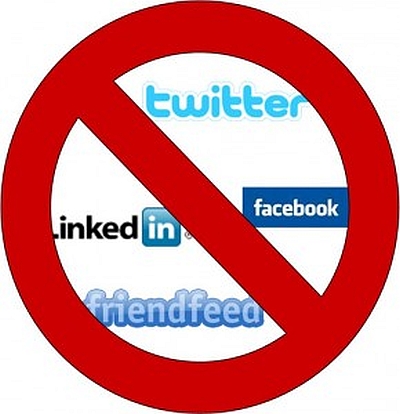Social Media is Anything But
April 14th, 2014Within the past few months, I’ve cancelled my accounts with Facebook, Twitter, and Google+.
Although I’d describe my initial participation on any of those “platforms,” as casual, I soon realized that any participation gobbled an amount of time disproportionate to any rewards. My new status? I’m a social media dropout.

Image Credit: Honey Singh
Facebook was the first to go. Initially, I’d thought it was great, a fine way to connect with people in my new hometown. That was until I met some of them face-to-face.
Despite the aura these “friends” had projected on my Facebook page, a cooler-than-thou hipness of which I could only dream, I would have been uncomfortable inviting any of them to dinner. Think Goth, friends of Lisbeth Salander, pierced people who wear their hearts on their sleeves (or tattooed under their sleeves or, since this is Florida, instead of sleeves.) They were a gang who couldn’t put down their smartphones long enough to sustain a live conversation with another human. Maybe they actually date their phones, because those are the constant companions we see in the Instagram photos they post from trendy bars where they (not their phones), sip those $14.00 pomegranate martinis.
I two-timed Facebook when I had a brief fling with FourSquare. I really didn’t want an App to tell people where I was having a root canal, buying a Powerball ticket, or—on a very rare occasion— hanging out anywhere that might have been deemed truly fashionable.
And even if I was supposed to feel flattered that Mario Batali’s PR people thought I should know, I couldn’t muster much enthusiasm upon learning where his orange Crocs had last been spotted or that Mario had been chosen to preside as the mayor of some East Village hot-spot.
My negative experience with Twitter was my own fault. Thou Shalt Tweet, and I sinned in failing to do that with any consistency. I just never felt compelled to proclaim to my 54 followers (and the rest of the Twitterverse) that I was watching re-runs of The West Wing or preparing Pasta alla Carbonara.
I followed several high-profile people—writers, jazz artists, chefs, golfers… (all with considerable Twitter entourages, but none of whom were following me). It was soon apparent that whenever the celebs tweeted, legions of their fans promptly re-tweeted those original posts as if to say, “See how cool we are, quoting Anthony Bourdain and Tiger Woods.” Truth to tell, it was a drag to wade through this mindless parroting in search of an original Tweet, 140 meaningful characters from any figure I had chosen to follow.
Finally, just to be sure I hadn’t missed out altogether, I created an account on Google+. In this case, I did some homework before jumping in. I downloaded Guy Kawasaki’s book, What the Plus to ensure I didn’t immediately commit an egregious faux pas. I followed Mr. Kawasaki’s sign-up advice to the letter: filling in all the blanks about my background, education, and accomplishments, right down to a garnish of personal trivia (Yes, I was indeed the percussionist on the original cast album of the Broadway hit Annie.)
I invited a few people into my Google Circle, but rapidly found the Circle to be no more than a magnifier of my Twitter experience.
I’m a photographer, so I followed a few other photographers whose work I admire. And for a while, that seemed to bode well. But soon, the Google+ equivalent of the re-tweet began. I’d open my Google+ page to see the same image 30 or 40 times along with posting parties’ comments like “cool” or “great shot,dude” and—invariably—the URLs to their own websites or Flickr.com pages.
I’ve concluded that the basis of all these “platforms” seems to be that thousands of people want you to believe something that isn’t quite true. All those “friends” want you think they actually know food photographer Penny De Los Santos and that, if you want to be a real player, you should claim to know her too. But the truth is that most of us are merely pretending to know her personally and that very few of us ever will.
This sorry state of aspirational acquaintance goes back a ways, to those trolls who lay in wait in the tangle of old usenet threads. But what was mere noise on the Internet in the 1990s has since become an intolerable din. People are spending their lives talking at each other. Or maybe talking to no one at all.
As a software engineer, I felt an obligation to learn the tools of social media and use them—to stay connected with people in both my professional and leisure lives. Before quitting, I’d put in more time than I care to admit, but now, I feel I’ve earned all the free time this departure has given me, time I am now spending in focused reading, watching, and listening to the people I admire most. It turns out that many of them may not even have an Internet connection, let alone a Website or “social media presence.” Yet, funnily enough, they continue to go about their days speaking, writing, singing, painting, shooting pictures, and cooking—in short creating and performing—not for a virtual world filled with zombie avatars, but for themselves and the rest of humanity. Their dominion remains a world of words, images, music, and food, all created with quiet competence and little regard for who may be “following,” “liking,” or “retweeting” them. I find it all so old-fashioned—and refreshing.



